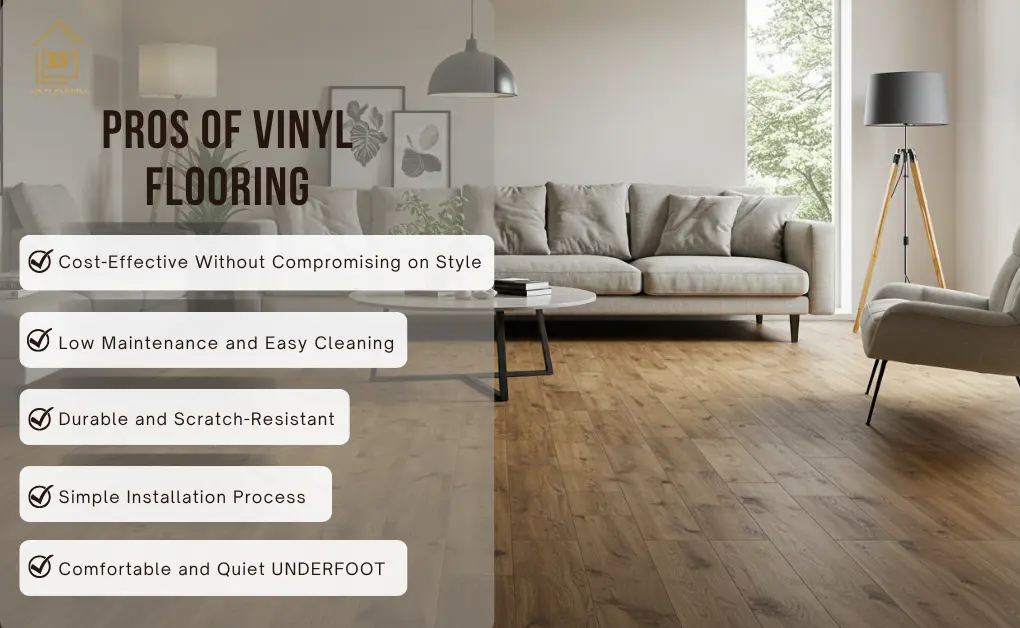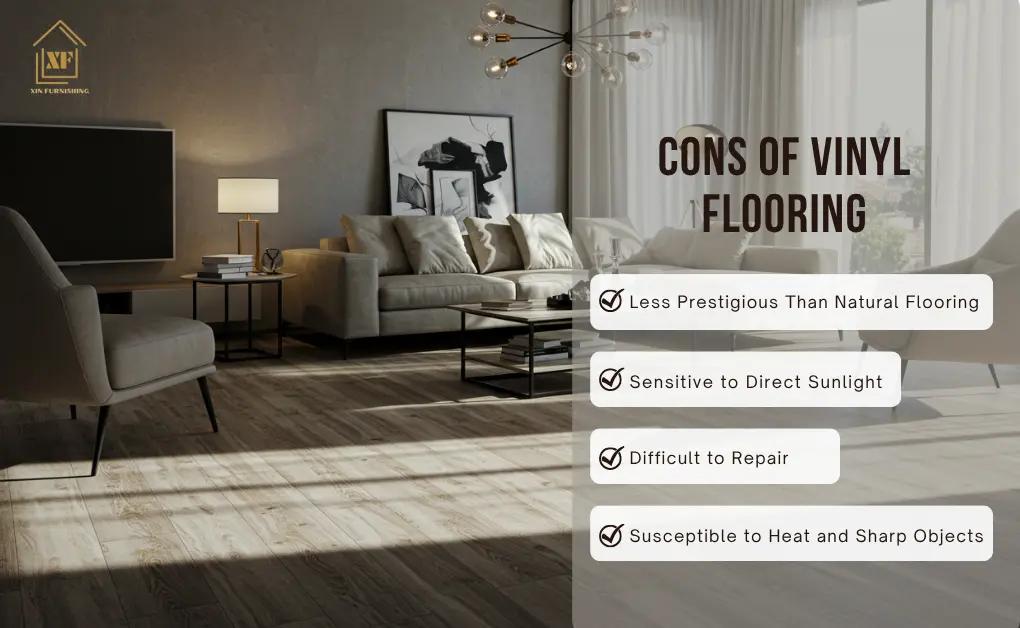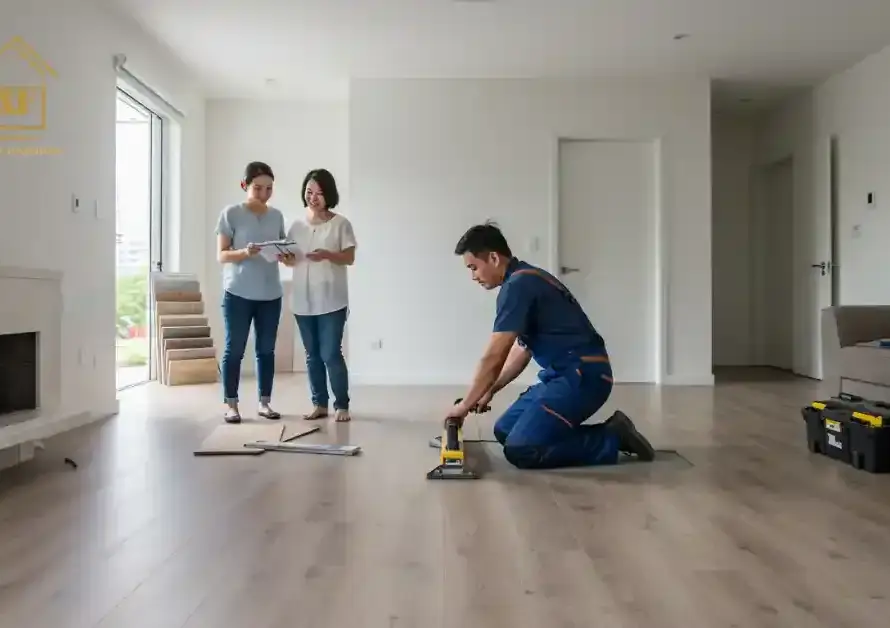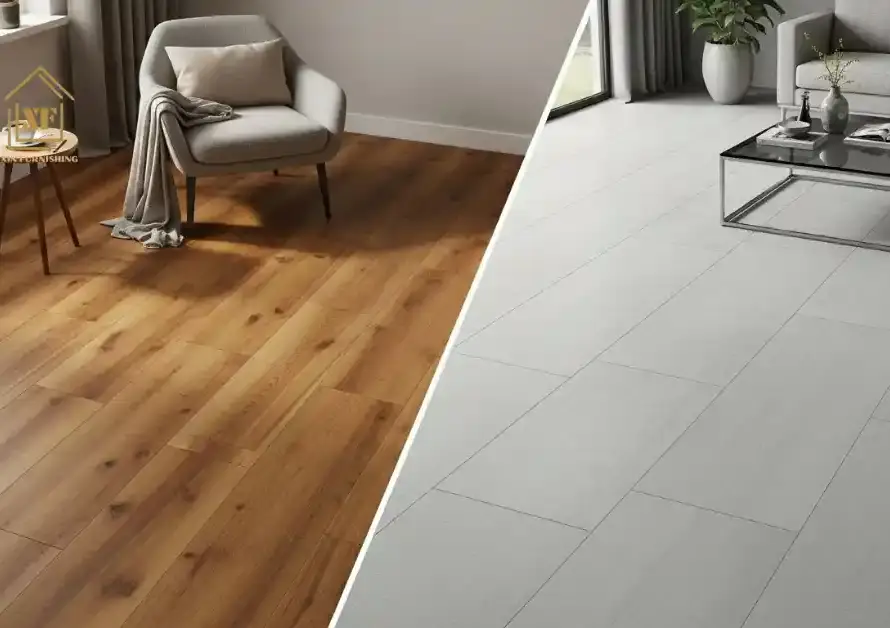Flooring plays a vital role in defining the look, comfort, and functionality of your living space. Whether you’re renovating your HDB flat, designing a new condominium unit, or upgrading a landed property, vinyl flooring has likely come up as a strong contender. Its rise in popularity across Singapore homes and offices is no coincidence.
In this detailed guide, we’ll walk you through the vinyl flooring pros and cons, helping you decide whether it’s the right choice for your space. From budget-conscious buyers to homeowners seeking stylish and water-resistant surfaces, vinyl flooring offers a compelling range of benefits, though it’s not without a few limitations.
Pros of Vinyl Flooring

1. Cost-Effective Without Compromising on Style
One of the most appealing advantages of vinyl flooring is its affordability. Compared to natural hardwood, ceramic tiles, or marble, vinyl is significantly more cost-effective, both in terms of product price and installation costs. This makes it ideal for homeowners who want to stay within budget without sacrificing design.
You’ll find many vinyl flooring packages in Singapore that include material, labour, and installation, saving you both time and money. For HDB renovations or condo upgrades, vinyl flooring offers an economical solution that doesn’t skimp on style.
2. Resistant to Moisture and Humidity
Singapore’s tropical climate is known for its high humidity and frequent rain, which can be challenging for many types of flooring. Fortunately, vinyl flooring is water-resistant, making it suitable for damp-prone areas like kitchens, bathrooms, laundry rooms, and entryways.
Unlike laminate or wood, which can warp or swell when exposed to moisture, vinyl maintains its structure and appearance. This resilience makes it a top flooring choice for Singapore homes, especially in high-moisture environments.
3. Low Maintenance and Easy Cleaning
Vinyl flooring is incredibly easy to maintain. It only requires regular sweeping or vacuuming and occasional mopping with warm water or a vinyl-safe cleaner. There’s no need for waxing, polishing, or expensive treatments.
If you’re researching how to clean vinyl floors, you’ll be pleased to know that most messes. Whether it’s dust, spills, or pet hair, it can be wiped up quickly. This makes vinyl ideal for families, pet owners, or anyone who prefers hassle-free upkeep.
4. Durable and Scratch-Resistant
Despite its soft underfoot feel, vinyl is highly durable and resistant to scratches, scuffs, and dents. When properly installed and maintained, it can last anywhere from 10 to 20 years. Many modern vinyl tiles are also coated with a protective wear layer that adds extra strength against everyday foot traffic, furniture movement, and minor spills.
This makes vinyl flooring especially suitable for busy households or commercial settings like retail shops and small offices. It’s a solid long-term investment for those looking for a blend of function and aesthetics.
5. Simple Installation Process
Vinyl flooring is available in easy-to-install formats, such as click-lock planks, which allow homeowners to lay down flooring without the need for nails, glue, or professional help. Even if you prefer to hire a flooring contractor, the installation process is usually faster and more affordable than with traditional tile or timber flooring.
For those seeking a convenient and clean renovation process, vinyl flooring minimises downtime and mess, making it perfect for quick HDB makeovers or time-sensitive projects.
6. Comfortable and Quiet Underfoot
Unlike cold tiles or hard stone, vinyl flooring offers a soft and slightly cushioned feel underfoot. It’s more comfortable to walk and stand on for long periods, especially when combined with underlayment. In multi-storey buildings, vinyl also helps with sound absorption, making it ideal for flats, condos, or offices where noise control is important.
If you want a flooring material that balances visual appeal with everyday comfort, vinyl is a strong contender.
Cons of Vinyl Flooring

1. Less Prestigious Than Natural Flooring
While vinyl flooring can convincingly replicate wood, marble, or stone, it doesn’t quite match the premium feel or resale value of real natural materials. Some homeowners may still prefer authentic hardwood or marble for its perceived prestige, especially in luxury properties.
If you’re considering resale or want to impress with original finishes, vinyl may not be the first choice, but it’s still an excellent option for practicality and affordability.
2. Sensitive to Direct Sunlight
Long-term exposure to direct sunlight can cause certain types of vinyl to fade or discolour. In sunny rooms or spaces with large windows, it’s best to use curtains or blinds, or choose vinyl flooring with UV protection.
This downside is minor but worth noting, especially for open-concept living rooms or balconies with ample sunlight.
3. Difficult to Repair
If a vinyl plank or tile gets scratched or damaged, it typically can’t be refinished or sanded like real wood. You’ll often need to replace the damaged section entirely, which can be tricky if the same design is discontinued. Keeping extra planks from your original batch is recommended.
This is one area where vinyl falls short compared to materials that can be patched or resurfaced more easily.
4. Susceptible to Heat and Sharp Objects
Vinyl can be dented by sharp furniture legs or damaged by excessive heat. Avoid dragging heavy items across the surface, and never use steam mops, as the high heat can weaken the adhesive and cause planks to warp.
Always follow manufacturer guidelines for cleaning and maintenance to protect your floor’s lifespan.
Where to Use Vinyl Flooring in Your Singapore Property
Vinyl flooring is versatile and well-suited for almost every room:
- Living Rooms: Offers a warm, homely feel without the maintenance of wood
- Bedrooms: Soft, quiet, and comfortable underfoot
- Kitchens & Bathrooms: Water-resistant and easy to clean
- Offices & Retail Spaces: Durable enough to handle foot traffic and stylish enough to impress clients
Thanks to its adaptability, vinyl is considered one of the best flooring options in Singapore for modern homes and commercial interiors.
Where to Buy Vinyl Flooring in Singapore?
Looking for the Best vinyl flooring supplier in Singapore? At Xin Furnishing, we offer a premium selection of:
- Wood series vinyl flooring – Warm, natural timber tones
- Stone series vinyl flooring – Elegant stone and marble vinyl flooring looks
- Click-lock planks and vinyl tiles – Easy-to-install formats
- Vinyl flooring packages – Including supply and expert installation
Our showroom is located at 101 Woodlands Ave 12 #01-02, Polaris @ Woodlands, and we serve customers islandwide. Whether you’re furnishing a new BTO or upgrading your condo, our team can guide you through product selection, design consultation, and professional installation. We offer a wide range of wood vinyl flooring and stone vinyl flooring options to suit every style and budget.
Final Thoughts – Is Vinyl Flooring Right for You?
Vinyl flooring offers an excellent combination of durability, affordability, and style, making it a smart flooring solution for modern Singaporean homes. While it may not replace the prestige of natural materials, it makes up for it with easy maintenance, comfort, and a wide design variety.
Whether you’re aiming for a marble-look kitchen floor or a timber-style living room, vinyl gives you the flexibility to achieve the look you want without overspending. Understanding the vinyl flooring pros and cons can help you make a confident and informed decision for your space.
FAQS
Is vinyl flooring suitable for Singapore’s weather?
Yes, vinyl flooring is highly suitable for Singapore’s humid and tropical climate. It’s water-resistant, does not swell like wood, and performs well in moisture-prone areas.
Can vinyl flooring be used in bathrooms or kitchens?
Yes, vinyl is ideal for wet areas like kitchens and bathrooms. Its water-resistant properties make it a safe and practical choice for these spaces.
How long does vinyl flooring last?
With proper care and installation, vinyl flooring can last 10–20 years. Its longevity depends on the wear layer, usage, and maintenance.
Is vinyl flooring better than laminate?
Vinyl is more water-resistant and better suited for humid environments compared to laminate. Laminate may offer a harder surface, but vinyl is softer and more versatile.


